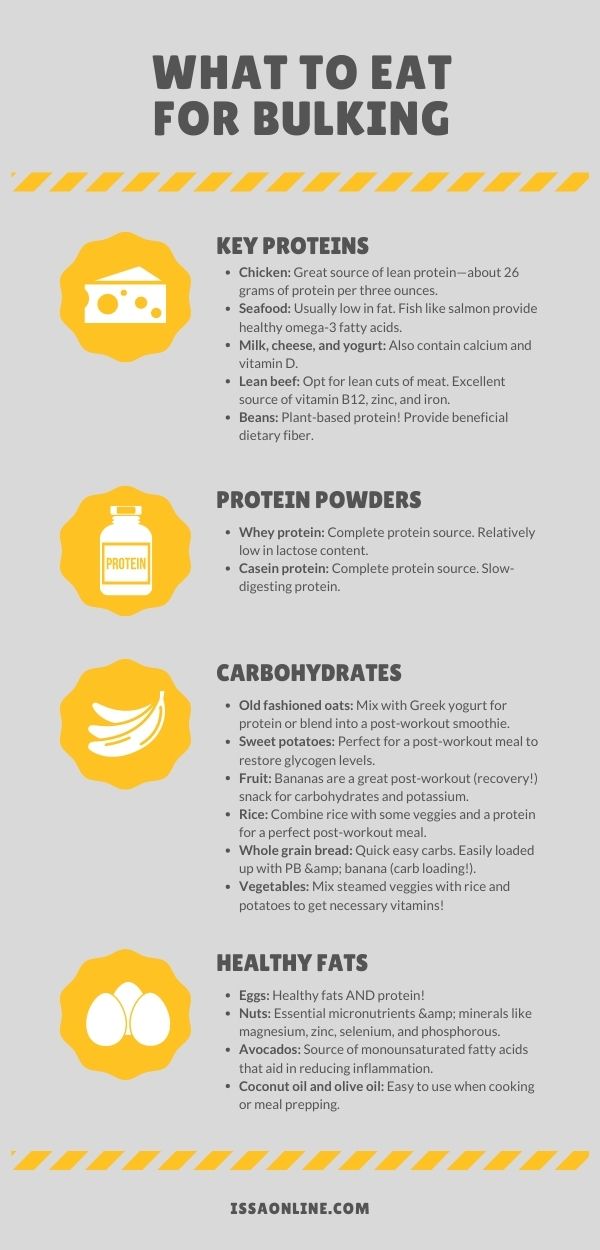Aladingsc Insights
Your go-to source for trending news and informative guides.
Feed Your Gains: The Surprising Science of Bulking
Unlock the secrets to effective bulking! Discover the science behind muscle gain and fuel your fitness journey like never before.
The Science of Bulking: How to Fuel Your Muscle Growth Effectively
The Science of Bulking involves understanding how to effectively fuel your muscle growth through proper nutrition and training. Bulking is a phase where individuals aim to increase their muscle mass by consuming more calories than they burn. To achieve this, it's essential to focus on a balanced intake of macronutrients, namely proteins, carbohydrates, and fats. A good starting point is to aim for a caloric surplus of about 250-500 calories per day, depending on individual factors like body weight and activity level. Incorporating nutrient-dense foods such as lean meats, whole grains, and healthy fats can help ensure that the additional calories contribute to muscle rather than fat gain.
Supplementing your diet with protein is crucial for muscle repair and growth. Experts recommend consuming approximately 1.6 to 2.2 grams of protein per kilogram of body weight for optimal results. Additionally, timing your protein intake around workouts can enhance muscle protein synthesis. Consider distributing your protein intake evenly across 4-6 meals throughout the day. Lastly, pairing your protein with a good mix of complex carbohydrates will provide sustained energy for your workouts, further supporting your muscle growth journey.

Common Myths About Bulking: What You Need to Know
When it comes to bulking, many people hold onto common myths that can hinder their progress. One prevalent misconception is that bulking simply means eating anything and everything without restraint. In reality, an effective bulking phase requires a caloric surplus along with a focus on nutrient-dense foods. This means prioritizing protein, healthy fats, and complex carbohydrates rather than indulging in junk food. Proper macronutrient management is essential for muscle growth, and neglecting this can lead to unwanted fat gain rather than the lean mass you’re aiming for.
Another myth is that bulking is only for bodybuilders or competitive athletes. In truth, anyone looking to increase muscle mass can benefit from a well-structured bulking plan. It's essential to remember that bulking isn't just about increasing size; it's also about promoting strength and performance. Additionally, many fear that bulking will lead them to become overweight, but with the right approach—such as incorporating strength training and monitoring body composition—this can be managed effectively. Embracing the right mindset can turn the bulking process into a valuable opportunity for all fitness enthusiasts.
Is Clean Bulking Really Necessary? Debunking Fitness Myths
Is clean bulking really necessary? This question has sparked considerable debate within the fitness community, as many individuals strive to achieve their muscle-building goals while managing body fat levels. Clean bulking refers to a diet strategy that focuses on eating nutrient-dense foods without excessive calories from unhealthy sources. However, some argue that strict adherence to clean bulking is not essential for muscle growth. They contend that the primary factor for gaining muscle is a sufficient calorie surplus rather than the quality of those calories. This misconception leads to the notion that any weight gain must be 'clean,' which can create unnecessary stress around food choices.
On the flip side, debunking this fitness myth suggests that a balanced approach may yield better long-term results. While clean foods provide essential vitamins and minerals crucial for recovery and performance, allowing for some flexibility and enjoyment in one’s diet can promote sustainability and adherence. Researchers emphasize that the key to effective bulking lies not solely in the purity of food but also in consistent and strategic training practices, adequate hydration, and rest. Thus, while clean bulking can certainly be beneficial, it is not the only path to success in building muscle and achieving fitness goals.